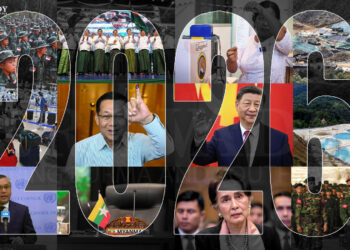The Myanmar military regime is sponsoring weekly pilgrimage tours for government employees to its recently opened colossal Buddha image in Naypyitaw in an apparent attempt to create the impression that the sitting Buddha has become a popular religious attraction.
Opened to the public on Aug. 1, the Maravijaya statue has been shrouded in controversy since regime chief Min Aung Hlaing ordered its construction following his coup in 2021. Many have questioned his motive for building the image, suspecting the regime chief is exploiting Buddhism, the predominant religion in Myanmar, for political gain. Given his regime’s record of committing atrocities, including killing civilians who reject military rule, the statue has been popularly dubbed the “dictator’s pagoda” and many people are boycotting the location—a strong and daring gesture of resistance in Myanmar, where such images usually inspire great reverence.
Located in a vast complex built on scrubland on the outskirts of sprawling Naypyitaw, the site of the statue is not visitor-friendly—and that alone is enough to deter many potential visitors.
“Needless to say, I will never visit the dictator’s pagoda. He is just using Buddhism and the Buddha statue to burnish his evil image,” a Yangon resident said.
Well aware of this sentiment, and eager to spare his giant Buddha image the fate of being ‘the loneliest statue in Myanmar,” every weekend Min Aung Hlaing buses a flock of government staff from ministries and departments to Naypyitaw to visit the marble colossus, according to people who have been on the tours.
The state employees reportedly feel they have no choice but to join the tours. To sweeten the deal for employees who visit the statue, the regime covers their transportation costs and offers each visitor an allowance, sources said.
“Each employee was allowed to bring a family member. They also received a 5,000-kyat [US$1.50] allowance,” said a relative of a government employee from Yangon who recently visited the site.
The regime even throws in a free lunch.
Last week, free vegetable biryani was provided to every statue-goer—including a group of 300 Yangon City Development Committee staff and their family members—by the Shwe Than Lwin Company, one of the companies that donated a large sum of money to the regime pagoda’s construction fund.
Naypyitaw-based government employees from ministries and agencies including the Union Election Commission, Ministry of Legal Affairs and Ministry of Sports and Youth Affairs visited the pagoda last month.
An employee from the Ministry of Transport and Communications who recently took a sponsored tour to the pagoda recalled that she saw very few outside visitors, or other people aside from pagoda staff, even though it was a weekend.
“Normally, we have private errands to take care of during the weekend. But we were forced to visit the pagoda. It’s annoying,” she said.
Since its opening to the public last month, regime officials have posted photos to the statue’s Facebook page, “Smiling Buddha”, looking to create the false impression that there is no shortage of pilgrims flocking to see it. It fails to mention the fact that most of the visitors were government staff on the regime’s sponsored tours, treated to the daily allowance and free lunch.

















